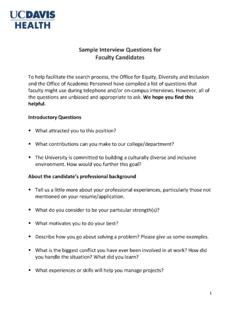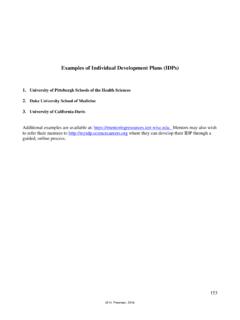Transcription of How to Mentor Graduate Students - Horace H. Rackham …
1 How to Mentor Graduate StudentsA Guide for FacultyTable of ContentsLetter from Dean Mike Solomon ..31. What Is a Mentor ? ..42. Why Be a Mentor ? ..63. What Does a Mentor Do? ..74. General Guidelines for Mentors ..95. Developing Shared Expectations ..126. Developing the Professional Relationship ..147. How Departments Can Encourage mentoring ..168. mentoring in a Diverse Community ..199. Summary and Resources for Further Learning ..21 Appendix ..22 2020 The Regents of the University of Michigan All Rights ReservedThe University of Michigan grants permission to all educational institutions to copy any material contained in this guidebook with proper PDF of this handbook can be downloaded at Rackham Graduate School s mentoring guide for faculty , How to Mentor Graduate Students : A Guide for faculty , has proven to be a popular item for two decades; it has been requested, adopted, and adapted by Graduate Students , faculty , and staff around the country.
2 Improving the quality of mentoring available to our Students , as well as providing resources for both Students and faculty , remains a top priority for 2019, Rackham s MORE ( mentoring Others Results in Excellence) Committee, a multidisciplinary faculty group committed to improving mentoring for Graduate Students , updated the guide to reflect Rackham s mission and vision as applied to mentoring . Adam J. Matzger, committee chair, and Zana Kwaiser, MORE program manager, provided critical edits and were instrumental in making this revised volume possible.
3 Dear Colleagues, faculty mentors play a crucial role in the success of Graduate Students ; at Rackham , we hear this message frequently from Students . While styles of mentoring vary across the disciplines and by personal inclination, the fundamentals apply throughout Graduate education. Our goal in creating this guide is to provide a resource for faculty members who seek to improve their relationships with doctoral Students and their effectiveness in working with them. We hope it is useful not only for those who are new to the role, but also for those who have enjoyed success and are looking to become more skillful in the wide variety of situations that and their mentors share responsibility for ensuring productive and rewarding mentoring relationships.
4 Both parties have a role to play in the success of mentoring . This handbook is devoted to the role of faculty members, though there is a companion volume for Graduate the following pages, we have included mentoring plan templates and campus resources that can assist you in cultivating a positive Mentor -mentee appreciate your interest in this guide, your commitment to the profession, and your engagement in the rewarding work of mentoring Graduate ,Mike SolomonDean of the Rackham Graduate SchoolVice Provost for Academic Affairs231.
5 What Is a Mentor ?Describing the landscape of twenty-first century Graduate education and its population includes acknowledging that the quantity of knowledge has exploded, the boundaries between disciplines have blurred, and that advances in the resources and methods available for study and research continue to fuel change within modes of Graduate education. The role of a Mentor in this environment is to teach, sponsor, encourage, counsel and befriend a less skilled or less experienced person for the purpose of promoting the latter s professional and/or personal development (adapted from Anderson and Shannon, 1988).
6 Mentors serve a vital role in Graduate education and in the preparation of the next generation of intellectual leaders, and yet the role is one that carries little formal key characteristic of Graduate education and training is that the pool from which the individuals engaged in Graduate teaching, learning, and research are drawn is more diverse than ever before. Groups of individuals who were rarely included in higher education in past generations are now prevalent. These diverse groups of faculty and Graduate Students bring invigorating experiences and perspectives to the enterprise, and they drive a concomitant expansion of appropriate areas for scholarly investigation.
7 The relatively new aspects of the Graduate education enterprise necessitate both a broader, and more sophisticated notion of mentoring than what the apprenticeship model of Graduate education required at its inception in the 19th century. Consider this multi-faceted definition of mentors as individuals who (Alvarez et al., 2009; Paglis et al., 2006): take an interest in developing another person s career and well-being. advance academic and professional goals in directions most desired by the individual. tailor mentoring styles and content to the individual, including adjustments due to differences in culture, ethnicity, gender, and differences in student faculty limit the responsibilities of mentoring to their role as advisor.
8 While assigned advisors can certainly be mentors, effective mentoring requires playing a more expansive role in the development of a future colleague. The role of advisor usually is limited to guiding academic progress. The role of Mentor is centered on a commitment to advancing the student s career through an engagement that facilitates sharing guidance, experience, and of advisor is usually limited to guiding academic progress MentoringRole of Mentor is centered on a commitment to advancing the student s career through an engagement that facilitates sharing guidance, experience, and expertise Like any relationship, the one between Mentor and student will evolve over time, with its attendant share of adjustments.
9 New Graduate Students , in particular, may express the desire for a Mentor with whom they can personally identify, but their eventual level of satisfaction with their mentors seems to have little to do with this aspect of the relationship. This confirms the important point that you can be a successful Mentor even if you and your student do not share similar backgrounds (Ortiz-Walters and Gilson, 2005). Of course, each mentoring relationship should consider Students goals, needs, and learning style, but the core principles apply across the board.
10 What you and the student share a commitment to the goals of the scholarly enterprise and a desire to succeed is far more powerful and relevant than whatever might seem to divide as Students have different learning styles, the skill sets and aptitudes of mentors are as varied as mentors themselves. While a model for mentoring that still might be prevalent in some disciplines comes from the 19th century s apprentice model, today successful mentoring relies on evidence based, student-centered practices. This guide surveys strategies and approaches that have demonstrated their value.



